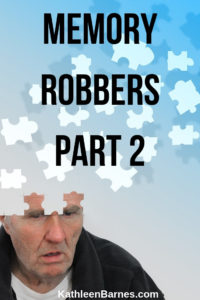 Continuing last week’s look at common prescription and over-the-counter drugs that are proven to cause memory loss, this week we’re looking at:
Continuing last week’s look at common prescription and over-the-counter drugs that are proven to cause memory loss, this week we’re looking at:
- Hypertension drugs
- Opioids and narcotic painkillers
- Sleep aids
- Incontinence drugs
- Parkinson’s drugs
Here’s a quick rundown and a brief look at natural alternatives:
- Hypertension drugs, best known as beta blockers, slow the heart rate and lower blood pressure. They are believed to impair memory by interrupting signals from the chemical messenger to the brain, especially epinephrine and norepinephrine. Among these drugs are atenolol, metoprolol, sotolol and timolol. Natural alternatives: Anything that reduces stress: try yoga, meditation and exercise. Balance your minerals—it’s incorrect to believe that too much salt causes high blood pressure in most people; it’s actually unbalanced minerals. Most of us should take a trace mineral supplement daily. Fun ways to lower blood pressure: Eat chocolate and eat more potassium-rich foods like oranges, cantaloupe, potatoes and mushrooms. Supplements like garlic, CoQ10 and l-arginine help dilate blood vessels and lower blood pressure.
- Opioids and narcotic painkillers: This one probably won’t surprise you. Narcotic painkillers work by interrupting pain signals to the brain. Unfortunately, the same chemical messengers interfere with long- and short-term memory, especially if you’re using them for an extended period of time. These dangerous drugs include fentanyl, hydrocodone, morphine, oxycodone and hydromorphone. They can cause addiction in as little as a week even when used to treat surgical pain. Natural alternatives: good quality CBD oil, acupuncture, yoga and marijuana. An interesting add-on: Marijuana has been documented as a memory robber. The culprit is THC—the active ingredient that causes a high. Researchers at Louisiana State University have confirmed that taking ibuprofen with medical marijuana eliminates the memory loss factor. This finding will likely broaden the legalization of medical marijuana and its proven success in treating many medical conditions, including seizures, nausea from chemotherapy and pain in cancer patients.
- Sleep aids: Prescription sleep aids can be very dangerous. We’ve all heard the stories of people who drive or eat or cook meals with no recollection later. That’s because of drugs like Lunesta, Sonata and Ambien. While these drugs are different from equally dangerous benzodiazepines, they use the same chemical pathways to the brain and are highly addictive, plus they can cause amnesia and sometimes trigger bizarre behaviors. Natural alternatives: melatonin, valerian, a specific type of echinacea that relieves insomnia and anxiety (often closely linked), homeopathics like Rescue Sleep and good sleep hygiene (no electronics, very dark and cool room, etc.). NOTE: Benadryl, a commonly used allergy drug, contains the exact same ingredients as over-the-counter sleep aids like ZZZQuil, Tylenol PM and Advil PM. Stay away from them!
- Bladder control drugs: I know, many of us—ahem–older ladies experience mild to serious bladder leakage. The drugs prescribed to address this problem are called anti-cholinergics. This is the precise class of drugs we have been discussing for the past two weeks. They block the brain production of acetylcholine by blocking the involuntary muscle contractions that lead to loss of bladder control and at the same time, they lead to memory loss, especially if taken over a long period of time and/or at the same time as other anti-cholinergic drugs in this class are taken. Drugs in this class include Oxytrol, Gelnique, Enablex, Vesicare, Detrol and Sancture. Oxytrol is sold over the counter. Nature alternatives; use vaginal weights, Kegel exercises, magnesium to reduce bladder spasms and vitamin D.
- Parkinson’s drugs: These prescription drugs, called dopamine agonists, activate the dopamine signaling pathway that is involved in many brain functions, including motivation, pleasure sensation, fine motor control, learning and memory. The most common side effects is memory loss, but also hallucinations, compulsive behaviors and delusions. These drugs, also increasingly being prescribed for restless legs syndrome, include Apokyn, Mirapex and Requip. Natural alternatives: Ask your doctor to prescribe another medication that is not a dopamine agonist, eat a diet high in natural and raw foods, high in fiber and healthy fats, not too high in sugar and proteins, supplement with fish oil, vitamin D, CoQ10, green tea.







